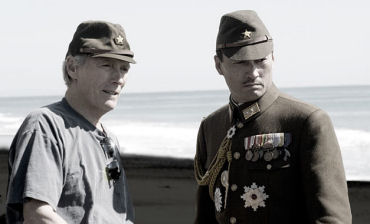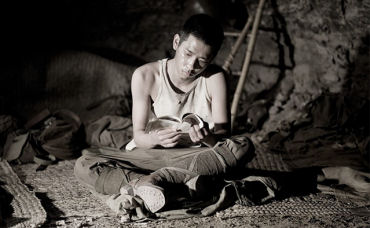No disrespect to Clint Eastwood‘s Flags of Our Fathers, but Letters From Iwo Jima — a sad elegiac portrait of the Japanese defenders of Iwo Jima during that horrific battle in early 1945 — is a much better film. It’s sadder, cleaner and more primal, for one thing, and the absence of all the cutting back-and-forth between the battle and the bond tour in Eastwood’s earlier Iwo Jima visitation feels like a kind of blessing.

The sense of increased focus in this Japanese-language film is immediately apparent, yielding as it does a more earnest humanistic aura along with a story that feels far more tragic. The Japanese troops know from the get-go that they haven’t a hope of victory against the American invaders, and so Letters quickly falls into relief as a compressed, bare-bones meditation about an eternal question that tugs at us all — how to live bravely and honorably in the face of certain death.
As Todd McCarthy has noted in his just-up Variety review, “considered from the Japanese angle Iwo Jima resembles the Alamo — a futile if heroic last stand against an enemy force too overwhelming to withstand, although withstand it they did, for much longer than their opponents imagined possible.”
Letters delivers at least three performances that are unquestionably more affecting than the respectable but muted ones in Flags — Ken Wanatabe‘s as General Tadamichi Kuribayashi, a portrayal of a combat-averse foot soldier named Saio by the unknown Kazunari Ninomiya, and Tsuyoshi Ihjara‘s as Baron Nishi, a kindly cultivated officer with a fondness for horses.
For the first time an American-made film is not only showing us what it was like for Japanese troops to fight U.S. forces — it’s a fascinating thing to consider guys from “our” side as faceless grunts and deliverers of doom — but provides insight into basic Japanese values of that time, not just in a military sense but in terms of their homeland, families and indeed their eternal spirits.

Letters starts out a bit slowly and carefully, and it feels a bit choppy and abbreviated in the early stages of the battle. But once it gets going — particularly during the second half, with the strongest portions coming during the final third — it delivers the goods and then some. Eastwood has reason to feel very proud. And lucky, in a sense. Something deep down told him he should attempt a Japan- ese-side-of-the-battle film while shooting Flags, and it was a good instinct.
In early October I heard from from a big-name critic who’d recently seen Flags that a person he spoke to from Eastwood’s camp had told him that as good as Flags was, Letters was the superior film. I’ve been hoping all along that this would turn out to be true. I had the heebie jeebies just before last Sunday’s Letters screening began, but less than five minutes in I knew the Eastwood-camp guy was right.
Watanabe should absolutely be added to the tally of Best Actor contenders — his Kuribayashi is cut from the same heroic, humanistic cloth that has begotten all great military leaders. The on-screen ones, I mean.
